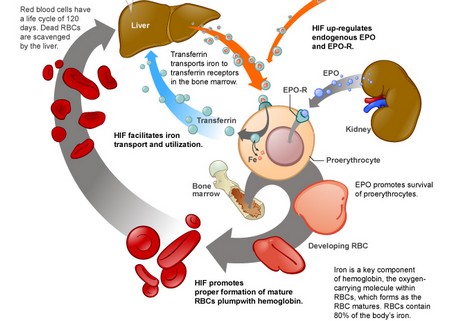Anemia is a condition in which body tissues get insufficient oxygen, either because there aren’t enough red blood cells in circulation or because the blood is low in hemoglobin, an essential protein. Anemia can result from blood loss or from something that destroys blood cells or interferes with their production in the body. Chronic blood loss can result from stomach ulcers or hemorrhoids. If you are suffering from hemorrhoids, it is best that you consult a doctor immediately for a Hemorrhoid Non Surgical Treatment. Iron-deficiency anemia occurs when the body lacks on, a necessary constituent of hemoglobin. It can be the result of heavy menstrual bleeding or a lack of iron in the diet. Anemia may also result from a lack of other nutrients, including folic acid and vitamin B12. Other types (for example, sickle-cell anemia) are hereditary.
Drugs and alcohol can also cause anemia. One cause of iron-deficiency anemia is the daily loss of imperceptible amounts of blood in the stool from habitual aspirin use, as by arthritis victims. This effect is particularly insidious because it produces no symptoms. It can be a serious threat to older people who don’t get enough iron and to women who have heavy periods. Besides iron, aspirin also increases your need for certain vitamins, notably C, B1, and folic acid.
Conventional Treatment
Anemia is usually treated with supplemental iron, but iron supplements aren’t very effective in rebuilding the blood. They take a long time to be absorbed, can be constipating, and are highly toxic in overdose. Enteric-coated supplements can’t be effectively absorbed and should be avoided. There is also research linking high levels of iron in the blood to an increased risk of heart attacks in men. It has been hypothesized that the lower risk of heart attacks in premenopausal women may be due, not to their higher estrogen levels (as has been thought), but to menstruation, which lowers their total iron levels. Don’t take iron supplements unless you need them. If you do need them, ferrous gluconate is the most absorbable form.
Anemia may also be treated conventionally with supplements of folic acid or other nutrients in which the patient’s blood levels are low. Serious types of anemia, for example those caused by bleeding of the digestive tract, are conventionally corrected by surgery.
The Oriental Approach
In Chinese medicine, diagnosis of anemia is made from a pale tongue or the faintness of the lines on the palm of the hand. The condition is referred to as “blood deficiency.” Chinese doctors say there is not enough blood in these cases to “nourish the heart,” so the Shen (spirit), which resides in the heart, is disturbed. The patient can’t sleep, has nightmares, experiences heart palpitations, becomes pale, loses her hair. The Chinese formula for correcting this condition in women is called Women’s Precious Pills by K’am Herbs. Take 2-3 pills 3x daily.
Normal, healthy women can become anemic just from menstruating. Normal, healthy men, on the other hand generally don’t become anemic. If they do have this problem, and if it’s not from a known source of blood loss like an injury, they probably aren’t manufacturing blood properly. Professional help should be sought to determine the cause, so the underlying problem can be treated.
Nutritional and Herbal Remedies
Chlorophyll, the “blood” of plants, can help rebuild the blood of humans. However, eating sufficient amounts of green vegetables to accomplish this result is difficult. The easier alternative is to take supplemental chlorophyll (two ounces in water two to three times daily), or green pills: spirulina, chlorella or The Ultimate Green by Nature’s Secret.
